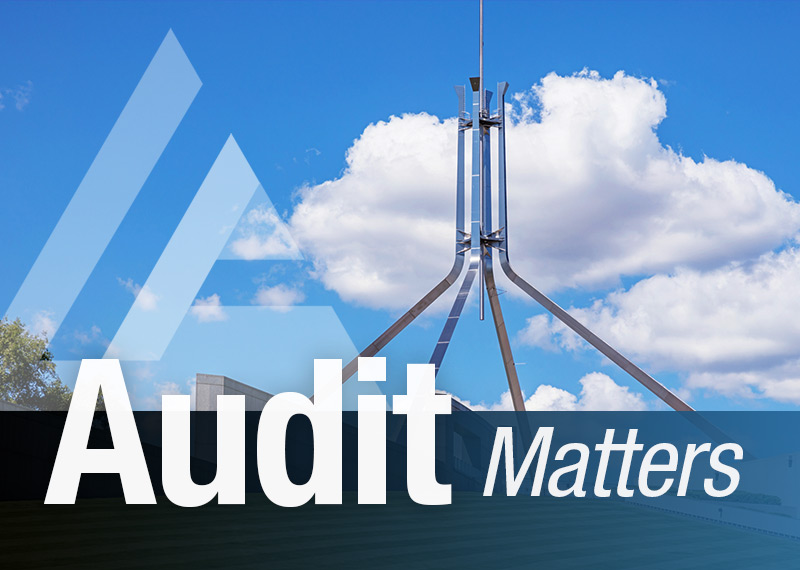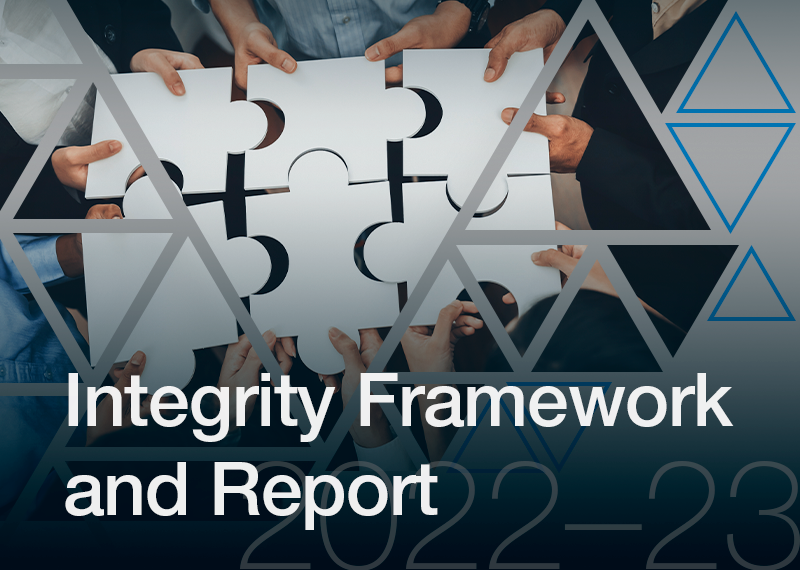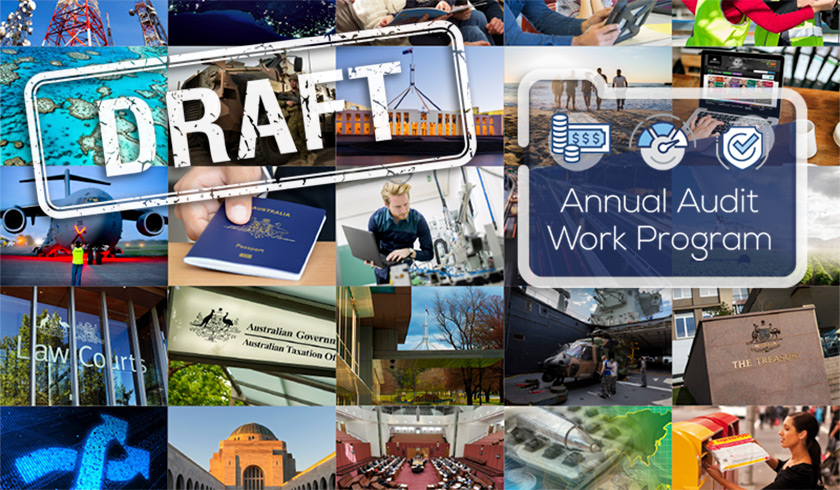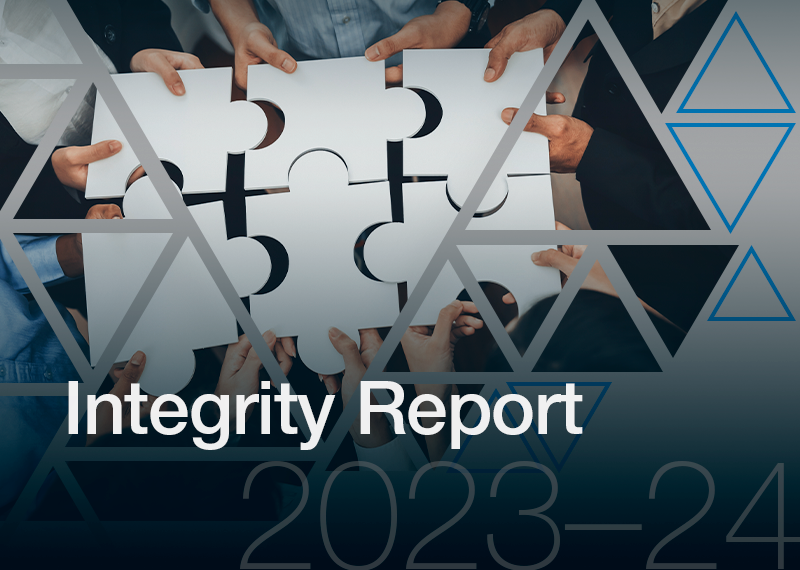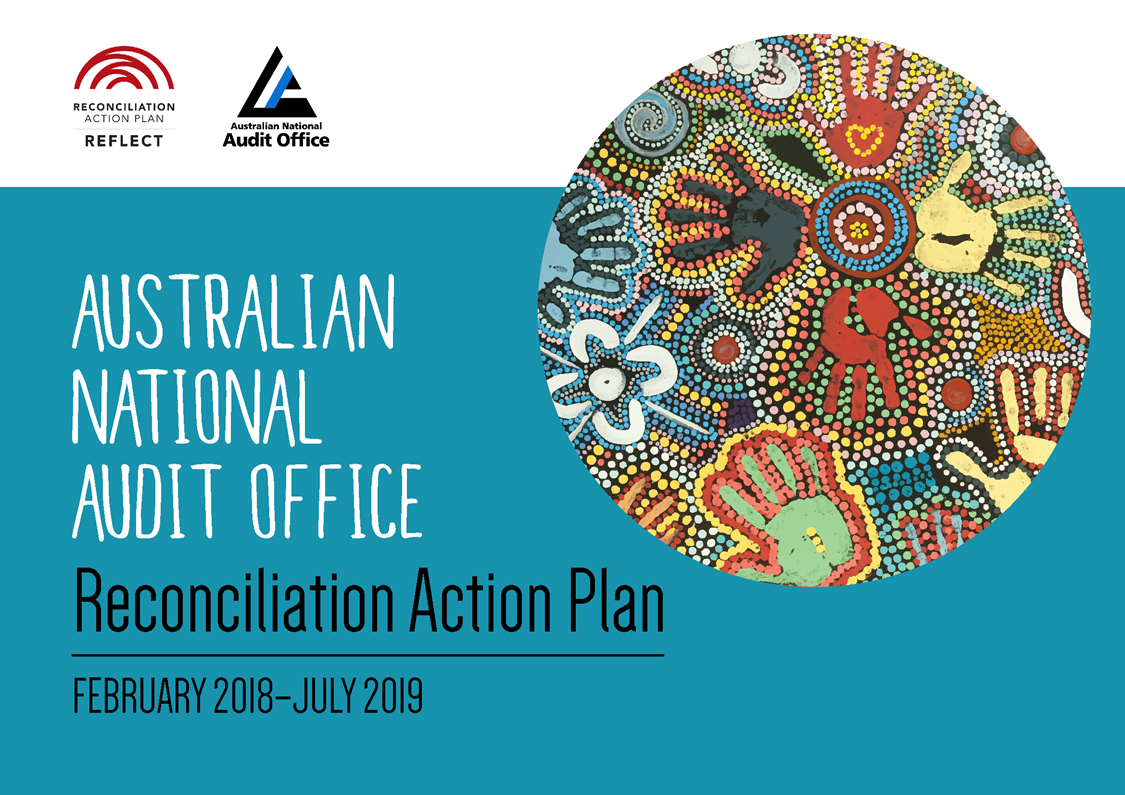Browse our range of reports and publications including performance and financial statement audit reports, assurance review reports, information reports and annual reports.
Mr Ian McPhee - Auditor-General for Australia, presented at the Australian Institute of Company Directors Public Sector Governance Conference
Mr P.J. Barrett (AM) - Auditor-General for Australia, presented at a Laboratory for Politicians and Top Managers from Different Public Institutions in Europe
Mr P.J. Barrett (AM) - Auditor-General for Australia, presented at the Comcover Federal Risk Manager (journal) Issue No 1 September 1999
Mr P.J. Barrett (AM) - Auditor-General for Australia, presented at the Department of Employment, Workplace Relations and Small Business Leadership Development Program
Mr P.J. Barrett (AM) - Auditor-General for Australia, presented to the PA Congress 1997:'CPAs for Today and Tomorrow', Adelaide
Mr Mr Ian McPhee - Auditor-General for Australia, presented at the 2014 National Conference of the Risk Management Institution of Australasia, Brisbane
Mr P.J. Barrett (AM) - Auditor-General for Australia, presented at a Seminar on 'Financial Management and Electronic Government' Kuala Lumpur
Mr P.J. Barrett (AM) - Auditor-General for Australia, presented at the CPA Congress '96 - Profit from our Experience - Melbourne
Mr Ian McPhee - Deputy Auditor-General, presented at the Band 3 Forum, Canberra
Mr Ian McPhee - Auditor-General for Australia, presented at the Department of the Prime Minister and Cabinet and the Australia New Zealand School of Government Conference
Mr P.J. Barrett (AM) - Auditor-General for Australia, presented to the Conference on 'Surviving the Year 2000 Computer Crisis' Canberra
Mr P.J. Barrett (AM) - Auditor-General for Australia, presented at the 2nd Annual New Directions in Australian Auditing Accounting Standards Conference
Mr P.J. Barrett (AM) - Auditor-General for Australia - Speaking Notes used for presentation to the Australian Bureau of Statistics SES and Middle Management Group
Mr P.J. Barrett (AM) - Auditor-General for Australia, presented at the Australian Corporate Lawyers Association and the Australian Institute of Administrative Law Conference on Outsourcing
Mr Ian McPhee, PSM - Auditor-General for Australia, address for the ANAO's 110th Birthday Celebration, National Press Club, Canberra
The objective of the audit was to examine the extent to which the Department of Human Services (Human Services) has implemented the recommendations made by the Australian National Audit Office (ANAO) in Auditor-General Report No. 37 of 2014–15 Management of Smart Centres’ Centrelink Telephone Services; as well as Human Services’ performance against call wait time and call blocking metrics.
Please direct enquiries through our contact page.
Mr P.J. Barrett (AM) - Auditor-General for Australia, presented at the 25th National Conference of Association of Risk and Insurance Managers of Australasia Limited
Mr Ian McPhee - Auditor-General for Australia, presented at the launch of the ANAO-PM&C Better Practice Guide: Implementation of Programme and Policy Initiatives
Mr P.J. Barrett (AM) - Auditor-General for Australia, presented at the Senior Executive Leadership Program - Preparatory day, Hill Station, Canberra
Mr P.J. Barrett (AM) - Auditor-General for Australia, presented at the CPA South Australia Annual Congress 2001, 'Riding the Next Wave'
Mr Mr Ian McPhee - Auditor-General for Australia, presented at the 5th Symposium of the Asian Organization of Supreme Audit Institutions (ASOSAI), Jaipur, India
Mr P.J. Barrett (AM) - Auditor-General for Australia, presented to the Central Agency Broker Seminar - Towards a Best Practice Australian Public Service - Hobart
Mr P.J. Barrett (AM) - Auditor-General for Australia, presented to the PAA National Conference - Reshaping the Old: Charting the New - Public Management in the 1990s - Melbourne
Mr P.J. Barrett (AM) - Auditor-General for Australia, presented at the 1999 Department of Employment, Training and Industrial Relations Biennial Risk Management Conference, Brisbane
The report objective is to provide the Auditor-General’s independent assurance over the status of 30 selected Major Projects, as reflected in the Statement by the Chief Executive Officer Defence Materiel Organisation (DMO), and the Project Data Summary Sheets prepared by the DMO, in accordance with the Guidelines endorsed by the Joint Committee of Public Accounts and Audit.
Mr P.J. Barrett (AM) - Auditor-General for Australia, presented at the Australian Government Solicitor Seminar - Identify, Protect and Defend your Intellectual Property Assets
Mr P.J. Barrett (AM) - Auditor-General for Australia, presented to the Queensland Commonwealth Regional Heads Forum 15th Annual Government Business Conference
Mr Ian McPhee - Auditor-General for Australia, address to the Risk Management Institution of Australasia -ACT Chapter Conference 'Building on Experience'
This edition of audit insights outlines key messages from Auditor-General reports which have examined the rapid implementation of government initiatives. The focus is on key lessons learned from audits of past activities, which are likely to have wider applicability to the Australian Public Service as it supports the national COVID-19 pandemic response. Topics covered include risk management, governance, resource mobilisation, accountability and program oversight in the context of rapid implementation.
Please direct enquiries about audit insights through our contact page.
On 3 February 2010, Senator Christine Milne wrote to the Auditor General raising concerns about DEWHA's administration of the Green Loans program and requesting a performance audit of the program. Issues raised included: uncapped assessor numbers; problems with the delivery of the program; the quality of assessor training and assessments provided to households; the lack of an audit facility within the program; and equitable access to work under the program.
In light of Senator Milne's request and other concerns in relation to the administration of the program, the Auditor-General agreed on 25 February 2010 to conduct a performance audit of the program. The objective of the audit was to examine key aspects of the establishment and administration of the Green Loans program by DEWHA and the program's transition to DCCEE. Particular emphasis was given to the program's three main elements:
- training, registration and contracting of assessors;
- scheduling, conduct, and reporting of home sustainability assessments, and the associated payments to assessors; and
- provision of green loans to householders, and the associated payments to participating financial institutions.
The audit also examined the extent to which steps had been taken by DEWHA and DCCEE to assess whether the Green Loans program was achieving its objectives.
Mr P.J. Barrett (AM) - Auditor-General for Australia, presented at the Government in Excellence Summit 2000 - Reinventing Government - A Manifesto for Achieving Excellence and Managing for Results; Singapore
Mr Mr Ian McPhee, AO PSM - Auditor-General for Australia, presented an Australian Country Paper at the 6th ASOSAI Symposium in Kuala Lumpur, Malaysia
Mr P.J. Barrett (AM) - Auditor-General for Australia, presented at the Public Service and Merit Protection Commission Senior Executive Service (SES) Breakfast Seminar Series
Mr P.J. Barrett (AM) - Auditor-General for Australia, presented at the Joint Launch by the ANAO, the Department of Industry, Science and Tourism and the Management Advisory Board
Financial statement audits are an independent examination of the financial accounting and reporting of public sector entities. The results of the examination are presented in an audit report, which expresses the auditor's opinion on whether the financial statements as a whole and the information contained therein fairly present each entity's financial position and the results of its operations and cash flows. The accounting treatments and disclosures reflected in the financial statements by the entity are assessed against relevant accounting standards and legislative reporting requirements.
Mr P.J. Barrett (AM) - Auditor-General for Australia, presented at the Launch of MAB/MIAC Report 22: Guidelines for Managing Risk in the Australian Public Service, Canberra
Mr P.J. Barrett (AM) - Auditor-General for Australia, presented at the 'Ensuring Accountability and Ethics with Corporate Governance in the Public Sector' - IIR Conference, Canberra
Mr P.J. Barrett (AM) - Auditor-General for Australia, presented at a Seminar for ANAO staff on Working with Parliamentary Committees. Parliamentary Education Office. The Commonwealth Parliament. Canberra
Mr Ian McPhee - Auditor-General for Australia, speaking at the book launch for 'Managing Performance - International comparisons' by Geert Bouckaert and John Halligan
Mr P.J. Barrett (AM) - Auditor-General for Australia, presented at the Launch of MAB/MIAC Report 17 - Guidelines for Managing Risk in the Australian Public Sector - An Exposure Draft
Mr Mr Ian McPhee - Auditor-General for Australia, presented to the Risk Management Institute of Australia and the Australasian Compliance Institute, at the 2nd Annual GRC Conference, Melbourne
Mr P.J. Barrett (AO) - Auditor-General for Australia, Opening Address to the inaugural conference of the Risk Management Institution of Australasia - Bringing Risk Management Together - What the Future Holds
Mr P.J. Barrett (AM) - Auditor-General for Australia, presented at a Joint Seminar by IPAA and ASCPAs as part of a Panel Discussion on 'Governance and the Role of the Senior Public Executive', Canberra
The purpose of Insights: Audit Opinion is to provide the Auditor-General's views on key issues facing the Australian public sector. This inaugural edition is on the topic of the Commonwealth Performance Framework and how it can be better used to drive effectiveness in the Australian public sector. This includes the need to prioritise the improvement of performance frameworks, embed a performance culture and use performance information to drive business improvement.
Please direct enquiries through our contact page.
Mr P.J. Barrett (AM) - Auditor-General for Australia, presented a speech on the occasion of the release by the Minister for Finance of the Second Trial Unaudited Financial Statements for the Commonwealth of Australia for the year ended 30 June 1996.
The ANAO corporate plan is the ANAO's primary planning document. It outlines our purpose; the dynamic environment in which we operate; our commitment to building capability; and the priorities, activities and performance measures by which we are held to account. This Quality Assurance Framework and Plan 2021–22 complements the corporate plan. It describes the ANAO Quality Assurance Framework and reflects the ANAO's quality assurance strategy and deliverables for the coming year.
The ANAO Quality Assurance Framework is the ANAO’s established system of quality control to provide the Auditor-General with reasonable assurance that the ANAO complies with the ANAO Auditing Standards and applicable legal and regulatory requirements and reports issued by the ANAO are appropriate in the circumstances.
The Quality Assurance Strategy and Plan component of this document identifies the key activities that the ANAO conducts to provide the Auditor-General with comfort that the controls established within the Quality Assurance Framework are implemented and operating effectively.
The ANAO reports on the audit quality indicators that measure the ANAO performance against target benchmarks in the annual Audit Quality Report published on the ANAO website. The Audit Quality Report also provides transparency with respect to the processes, policies and procedures that support each element of the ANAO Quality Assurance Framework and the achievement of the quality assurance strategy and deliverables set out in the Quality Assurance Framework and Plan.
Please direct enquiries through our contact page.
Mr Mr Ian McPhee - Auditor-General for Australia, participated in a panel discussion at the Australian Government Leadership Network Annual Conference (Queensland)
Grant Hehir, Auditor-General for Australia, delivered a presentation titled A reflection of how far performance auditing has come from its roots in the 1970s to where we are today and where we are heading, at the IMPACT Conference in Brisbane on 15 March 2016.
IMPACT brings together Auditors-General, leaders, practitioners, industry experts and academics from across the globe to discuss the future of performance auditing in the public sector, share experiences and question current practices.
Quality in the delivery of the ANAO’s audit services is critical in supporting the integrity of our audit reports and maintaining the confidence of the Parliament and public sector entities. The ANAO Corporate Plan 2023–24 is the ANAO’s primary planning document. It outlines our purpose; the dynamic environment in which we operate; our commitment to building capability; and the priorities, activities and performance measures by which we will be held to account. This quality management framework and plan complements the corporate plan. It describes the ANAO’s system of quality management and reflects the ANAO’s responses to quality risks for the coming year.
The ANAO Quality Management Framework is the ANAO’s established system of quality management to provide the Auditor-General with reasonable assurance that the ANAO complies with the ANAO Auditing Standards and applicable legal and regulatory requirements, and reports issued by the ANAO are appropriate in the circumstances.
The quality management framework and plan component of this document identifies the ANAO’s quality objectives and key responses to address identified quality risks and to provide the Auditor-General with confidence that those responses are implemented and operating effectively.
The ANAO reports on the audit quality indicators that measure the ANAO’s performance against target benchmarks in the annual audit quality report published on the ANAO website. The audit quality report also provides transparency with respect to the implementation and operation of the responses to address quality risks for each component of the ANAO’s system of quality management.
Please direct enquiries through our contact page.
Quality in the delivery of the ANAO’s audit services is critical in supporting the integrity of our audit reports and maintaining the confidence of the Parliament and public sector entities. The ANAO Corporate Plan 2024–25 is the ANAO's primary planning document. It outlines our purpose; the dynamic environment in which we operate; our commitment to building capability; and the activities and performance measures by which we will be held to account. This Quality Management Framework and Plan complements the Corporate Plan. It describes the ANAO’s system of quality management and reflects the ANAO's responses to quality risks for the coming year.
The ANAO Quality Management Framework is the ANAO’s established system of quality management to provide the Auditor-General with reasonable assurance that the ANAO complies with the ANAO Auditing Standards and applicable legal and regulatory requirements, and reports issued by the ANAO are appropriate in the circumstances.
The Quality Management Strategy and Plan component of this document identifies the ANAO’s quality objectives and key responses to address identified quality risks and to provide the Auditor-General with confidence that those responses are implemented and operating effectively.
The ANAO reports on the audit quality indicators that measure the ANAO’s performance against target benchmarks in the annual Audit Quality Report published on the ANAO website. The Audit Quality Report also provides transparency with respect to the implementation and operation of the responses to address quality risks for each component of the ANAO’s system of quality management.
Please direct enquiries through our contact page.
The objective of this performance audit was to assess the effectiveness of the administration of grants made to the ARTC. The audit involved an examination of DOTARS' administration of the grant funding approved for, and paid to, the ARTC (in respect of both the grants paid for projects approved under legislation and the three special grants). It also involved consideration of the role of Finance and the Department of the Prime Minister and Cabinet (PM&C) in advising on the special grant funding and (in respect of Finance) the payment and reporting arrangements for the grants. The audit was conducted under Section 18 of the Auditor-General Act 1997.
The audit objective was to assess Defence’s implementation of the five recommendations in ANAO Report No.19 2014-15 Management of the Disposal of Specialist Military Equipment and the related recommendation in JCPAA Report 449 Review of Auditor-General's Reports Nos. 1-23 (2014-15).
Please direct enquiries relating to reports through our contact page.
This report relates to the fourth audit of Financial Management and Accountability Act 1997 (FMA Act) agencies' compliance with the Order of the Senate for Departmental and Agency Contracts, (the Senate Order) to list, on the Internet, contract details for the reporting period 4 February 2002 to 3 February 2003. The audit was conducted in accordance with the Senate Order request for the Auditor-General to undertake twice-yearly examinations of agency contracts listed on the Internet, and to report whether there had been any inappropriate use of confidentiality provisions. The objectives of the audit were to assess agency performance in relation to compiling the Internet listings required by the Senate Order and the appropriateness of the use of confidentiality provisions in Commonwealth contracts.
This report relates to the fifth audit of Financial Management and Accountability Act 1997 (FMA Act) agencies' compliance with the Senate Order for Departmental and Agency Contracts, (the Senate Order) to list, on the Internet, contract details for the Financial Year 2002-2003 reporting period. The audit was conducted in accordance with the Senate Order request for the Auditor - General to undertake twice - yearly examinations of agency contracts listed on the Internet, and to report whether there had been any inappropriate use of confidentiality provisions. The objectives of the audit were to assess agency performance in relation to compiling the Internet listings required by the Senate Order and the appropriateness of the use of confidentiality of provisions in Commonwealth contracts.
This report has been prepared in response to a resolution of the Senate on 8 December 1994 which referred certain matters relating to the possible sale of ANL Ltd to the Senate Finance and Public Administration References Committee. The resolution directed the Committee to consider a report from the Auditor-General and drew the Auditor-General's attention to a range of specific issues and questions.
The Auditor-General responded on 14 December 2016, and followed-up on 19 July 2017, to correspondence from Senator Kakoschke-Moore on 14 November 2016 requesting that the Auditor-General conduct an audit of the National Affordable Housing Agreement (NAHA).
Please direct enquiries relating to requests for audit through our contact page.
The objectives of the audit were to determine whether FaCS and Centrelink had: a valid Business Case for the Edge project, as revised from time to time, including estimated costs, actual costs, and expected benefits; effective governance of the project, including reviews at critical points in the project and subsequent decisions to continue or, in the final analysis, to discontinue; an appropriate contract with SoftLaw, which was adequately managed; delivered appropriate advice on progress, project viability, and acceptable solutions to technical issues to Executive of FaCS and Centrelink during the project; and valid reasons for discontinuing the project. The ANAO began this audit in March 2004, four months after the Edge project was terminated, following the Auditor-General's agreement to a suggestion by the Joint Committee of Public Accounts and Audit that the project was a suitable subject for audit.
Welcome to the third edition of the ANAO’s Audit Matters newsletter. The purpose of Audit Matters is to provide updates on the ANAO’s work and provide insights on what we are seeing in the Australian Government sector.
Audit Matters complements the range of reports we table in the Parliament as well as our insights products and events and seminars. I hope you find it useful and please forward it on to your colleagues, and encourage them to sign-up for future editions.
Rona Mellor PSM, Deputy Auditor-General
Please direct enquiries through our contact page or subscribe to receive the email version of Audit Matters in the future.
The Australian National Audit Office (ANAO) Audit Manual is issued under the authority of the Auditor-General and is comprised of four volumes. The four volumes (shared content, FSASG specific, PASG specific and PSASG specific) set ANAO policies and provide guidance applying to the audits and other assurance work performed by, or on behalf of, the Auditor-General, and consistent with ANAO Auditing Standards.
The manual complements the mandatory requirements of the ANAO Auditing Standards and relevant legislation. The manual is reviewed annually and is subject to the oversight of the ANAO Quality Committee.
Please direct enquiries through our contact page.
The ANAO Quality Assurance Framework is the system of quality control that the ANAO has established to provide the Auditor-General with reasonable assurance that the ANAO complies with the ANAO standards and applicable legal and regulatory requirements and reports issued by the ANAO are appropriate in the circumstances.
The Audit Quality Report demonstrates the ANAO assessment of the implementation and operating effectiveness of the elements of the ANAO Quality Assurance Framework. The report provides transparency in respect of the processes, policies, and procedures that support each element of the ANAO Quality Assurance Framework, and reports audit quality indicators measuring ANAO performance against target benchmarks.
This report also includes the achievement of the quality assurance strategy and deliverables set out in the ANAO Quality Assurance Framework and Plan 2019–20.
Please direct enquiries through our contact page.
An Audit Committee Chairs Forum was held on Friday 12 July 2024. The text on this page is the communique from the forum.
For any enquiries, please contact External.Relations@anao.gov.au
In November 1998, the Minister for Communications wrote to the Auditor-General requesting an assessment of the actual costs of Phase 1 digital conversion for the ABC and SBS, the sources of funds applied and the efficiency with which the funds had been used before the government considered further funding. The purpose of this limited scope performance audit was to assess a range of financial issues associated with the ABC and SBS conversion to digital broadcasting.
The objective of this audit was to assess the effectiveness of the ANAO’s internal budgeting and forecasting processes and practices. View the audit.
This page lists status updates about the ANAO's progress on recommendations contained in the audit.
Please direct enquiries through our contact page.
The Acting Auditor-General responded on 31 May 2017, and the Auditor-General followed-up on 19 July 2017, to correspondence from Mr Stephen Jones MP dated 15 May 2017. Mr Jones MP had requested that the Auditor-General conduct an audit of the Community Development Grants Programme, administered by the Department of Infrastructure and Regional Development, to provide an independent assessment of its administration.
Please direct enquiries relating to requests for audit through our contact page.
The ANAO Corporate Plan 2020–21 is the ANAO's key strategic planning document. It guides our operating environment and sets out how we will deliver on our purpose. This Quality Assurance Framework and Plan complements the Corporate Plan. It describes the ANAO Quality Assurance Framework and reflects the ANAO's quality assurance strategy and deliverables for the coming year.
The ANAO Quality Assurance Framework is the system of quality control that the ANAO has established to provide the Auditor General with reasonable assurance that the ANAO complies with the ANAO standards and applicable legal and regulatory requirements and reports issued by the ANAO are appropriate in the circumstances.
The Quality Assurance Plan component of this document identifies the key activities that the ANAO conducts to provide the Auditor-General with comfort that the controls established within the Quality Assurance Framework are implemented and operating effectively.
Please direct enquiries through our contact page.
The objectives of this follow-up audit were to:
- examine the ATO's implementation of the ten recommendations in The Australian Taxation Office's Management of its Relationship with Tax Practitioners (Audit Report No.19, 2002–03), having regard to any changed circumstances, or new administrative issues, affecting implementation of those recommendations; and
- identify scope for improvement in the ATO's management of its relationship with tax practitioners.
Follow up audits are recognised as an important element of the accountability processes of Commonwealth administration. Parliament looks to the Auditor General to report, from time to time, on the extent to which Commonwealth agencies have implemented recommendations of previous audit reports. Follow up audits keep Parliament informed of progressive improvements and current challenges in areas of Commonwealth administration that have previously been subject to scrutiny through performance audits.
Welcome to the inaugural edition of the ANAO’s quarterly Audit Matters newsletter. The purpose of Audit Matters is to inform external audiences — primarily those working in Commonwealth entities — of updates on the ANAO’s work and provide insights on what we are seeing in the Australian Government sector.
Audit Matters complements the range of reports we table in the Parliament as well as our Insights products and events and seminars. I hope you find it useful and please forward it on to your colleagues, and encourage them to sign-up for future editions.
Carla Jago, Acting Deputy Auditor-General
Please direct enquiries through our contact page or subscribe to receive the email version of Audit Matters in the future.
The Shadow Minister for Health and Ageing, Mr Stephen Smith, wrote to the Auditor-General on 11 March 2002 formally requesting an investigation into certain matters in relation to the 'Co-Location of National General Practice Organisations', a message detailed in the Health Portfolio Additional Estimates Statements 2001-02. The Federal President of the Australian Medical Association (AMA) Limited wrote to the Auditor-General on 11 March 2002, requesting a comprehensive audit of funding decisions by the Minister for Health and Ageing. The Australian National Audit Office has undertaken a preliminary examination of relevant papers relating to the 'GP House' matter. The preliminary examination focussed on whether or not due process was followed in making the decision to transfer funds between Outcomes. The preliminary examination also considered the procedures adopted by the Department of Health and Aged Care in developing the funding proposal, the advisory role played by the Department of Finance and Administration and specific advice provided by both departments to their Ministers. The examination further considered the disclosure of the related budget measure.
The Audit Activity Report: July-December 2002 summarises performance audit, financial audit and other related activities for the ANAO for the period. The key issues arising from the performance audits are summarised against the ANAO themes. The appendices in the report provide a short summary of each of the audits tabled for this period, the audits in progress as at 1 January 2003 and a list of the presentations and papers given by the Auditor-General and ANAO staff.
Allegations were made to the Senate Economics References Committee that the Australian Taxation Office and Australian Customs Service (Customs) had failed to pursue several cases of detected sales tax fraud. The Committee believed that this alleged failure may have stemmed from coordination problems between the two agencies. The Committee requested the Auditor-General to investigate this matter and report his findings to the Parliament.
The objective of this follow-up audit was to examine the ATO's implementation of the 20 recommendations in: The Administration of Petroleum Excise Collections (Audit Report No.17, 2001(02); and The Administration of Tobacco Excise (Audit Report No. 55, 2001(02), having regard to any changed circumstances, or new administrative issues, affecting implementation of those recommendations. The audit also aimed to identify scope for improvement in the ATO's administration of petroleum and tobacco excise. Follow-up audits are recognised as an important element of the accountability processes of Commonwealth administration. The Parliament looks to the Auditor-General to report, from time to time, on the extent to which Commonwealth agencies have implemented recommendations of previous audit reports. Follow-up audits keep the Parliament informed of progressive improvements and current challenges in areas of Commonwealth administration that have previously been subject to scrutiny through performance audits.
Under section 57 of the Financial Management and Accountability Act 1997 (FMA Act) the Auditor-General is required to report each year to the relevant Minister, on whether the financial statements of agencies have been prepared in accordance with the Finance Minister's Orders (FMOs) and whether they give a true and fair view of the matters required by those Orders.
Our interim audits of agencies encompass a review of governance arrangements related to agencies' financial reporting responsibilities, and an examination of relevant internal controls, including information technology system controls. An examination of such issues is designed to assess the reliance that can be placed on internal controls to produce complete and accurate information for financial reporting purposes.
An Audit Committee Chairs Forum was held on Friday 8 December 2023. The text on this page is the communique from the forum.
For any enquiries, please contact External.Relations@anao.gov.au
The Australian National Audit Office (ANAO) Corporate Plan is the ANAO’s key strategic planning document. It guides our operating environment and sets out how we will deliver on our purpose.
The Quality Assurance Framework and Plan complements the Corporate Plan. The ANAO Quality Assurance Framework is the system of quality control that the ANAO has established to provide the Auditor-General with reasonable assurance that the ANAO complies with the ANAO standards and applicable legal and regulatory requirements and reports issued by the ANAO are appropriate in the circumstances.
This Audit Quality Report demonstrates the ANAO assessment of the implementation and operating effectiveness of the elements of the ANAO Quality Assurance Framework. The report provides transparency in respect of the processes, policies, and procedures that support each element of the ANAO Quality Assurance Framework, and reports audit quality indicators measuring ANAO performance against target benchmarks.
This report also includes the achievement of the quality assurance strategy and deliverables set out in the Quality Assurance Framework and Plan 2020–21.
Please direct enquiries through our contact page.
This information report would cover Australian Government grants reporting following on from Auditor-General Report No. 7 2021–22 Australian Government Grants Reporting. The report would provide transparency of, and insights on government grants expenses and Commonwealth entities’ self-reporting of grants on GrantConnect.
Please direct enquiries through our contact page.
The Auditor-General responded on 22 August 2016 to correspondence from Senator Nick Xenophon on 20 May 2016 requesting a performance audit of the Command and Control System selection for the SEA 1000 Future Submarine Project.
Please direct enquiries relating to requests for audit through our contact page.
The Department of Defence is responsible for administering the Defence export facilitation program which is aimed at promoting Australian defence-relevant exports. The Department administers the program in cooperation with AUSTRADE. Defence is also responsible for administering export controls on defence and related goods and dual-use goods. The Department of Foreign Affairs and Trade is responsible for controls on chemical and biological weapons precursors. The Department of Primary Industries and Energy is responsible for controls on nuclear-specific technology and source/fissionable material. The Australian Customs Service implements barrier controls at ports and airports. In September 1993 the then Minister for Trade referred to the Joint Standing Committee on Foreign Affairs, Defence and Trade (JSCFADT) an inquiry into the implications of Australian defence exports. The JSCFADT's Report on the Implications of Australian Defence Exports (September 1994) recommended, inter alia, that the Auditor-General conduct a performance audit of the operations of the guidelines concerning the controls on the export of defence and related goods, the export control process, and all export facilitation activities. The Auditor-General agreed to undertake an audit, which commenced in May 1995 as a preliminary study and was designated as a performance audit on 30 August 1995.
The Proceeds of Crime Act 2002 establishes a scheme to confiscate proceeds of crime and allows for confiscated proceeds of crime to be re-invested in programs for relevant purposes, including crime prevention and law enforcement. Auditor-General Report No. 43 2016–17 Proceeds of Crime concluded that:
- effective processes had been established by the Attorney-General’s Department to identify the possible use of funds from the Confiscated Assets Account;
- appropriate advice was being provided to the Minister to inform decision-making; and
- the main beneficiaries of funding from the Confiscated Assets Account have been Commonwealth criminal intelligence or law enforcement entities with significant funds also approved for non-government, community organisations or local council’s projects, including through the Safer Streets Programme (examined in Auditor-General Report No. 41 2014–15 The Award of Funding under the Safer Streets Programme). In addition, the initial allocation to the Safer Communities Fund (examined in Auditor-General Report No. 16 2021–22) included unspent Safer Streets program funding (sourced from the Confiscated Asset Fund, under the Proceeds of Crime Act).
This audit would examine the processes through which funding allocations are identified, the appropriateness of the advice provided by the Attorney-General’s Department to inform funding decisions.
Please direct enquiries through our contact page.
In 2005, a 12-year $106 million contract was entered into by the Australian Government for helicopter response, surveillance and logistics support missions to prevent people smuggling and manage other maritime threats across the North West approaches of Australia. The term of the contract is due to expire in 2024 at an estimated total cost of $182 million. The Department of Home Affairs’ Annual Procurement Plan includes conducting a procurement in 2023—24 to replace this contract.
As set out in Auditor-General Report No. 6 2021–22, Management of the Civil Maritime Surveillance Services Contract the rotary wing contract is the second and smaller of two contracts the department has in place for aerial surveillance. The procurement process for, and management of, the rotary wing services contract was not examined in Auditor-General Report No. 6 of 2021–22 Management of the Civil Maritime Surveillance Contract. The conduct of the procurement of a new contract for rotary wing surveillance, response and logistic support services will provide an early indication of whether lessons have been learned from the management of the civil maritime surveillance services contract examined in that Auditor-General Report. The Joint Committee of Public Accounts and Audit has recommended that the ANAO undertake a performance audit of the Department of Home Affairs’ transition to the new surveillance services contract when the current contract expires (in 2027).
The audit would assess whether the conduct of the procurement employed open and effective competition and achieved value for money, consistent with the Commonwealth Procurement Rules (CPRs).
Please direct enquiries through our contact page.
The ANAO regards integrity as a core value of the organisation — critical in sustaining the confidence of Parliament, strengthening public trust in government and delivering quality audit products. Maintaining strong institutional integrity is critical to the operations and reputation of the ANAO.
The ANAO Integrity Framework provides an overarching structure to the integrity control system, supporting our institution’s integrity. The framework serves to assist in ethical decision making and risk, fraud and misconduct management.
Beyond its control system, the ANAO maintains an enduring focus on promoting integrity as a value that is embedded in our work and culture. The ANAO recognises that integrity demands quality not only in our products but also in the behaviours of our people.
The ANAO Integrity Advisor supports the effective and ongoing application of the Integrity Framework by providing advice to staff regarding integrity matters. The Integrity Advisor is responsible for increasing integrity awareness across the organisation and for reporting annually to the ANAO Executive Board of Management on actions taken under the Framework. The Auditor-General has published the ANAO Integrity Framework and Report for 2022–23 to provide increased transparency of the measures we undertake to maintain a high-integrity culture in the ANAO.
Please direct enquiries through our contact page.
Quality in the delivery of the ANAO’s audit services is critical in supporting the integrity of our audit reports and maintaining the confidence of the Parliament and public sector entities.
The Australian National Audit Office (ANAO) Corporate Plan is the ANAO’s key strategic planning document. It guides our operating environment and sets out how we will deliver on our purpose. The Quality Assurance Framework and Plan complements the Corporate Plan.
The ANAO Quality Assurance Framework is the system of quality control that the ANAO has established to provide the Auditor-General with reasonable assurance that the ANAO complies with the ANAO standards and applicable legal and regulatory requirements, and reports issued by the ANAO are appropriate in the circumstances.
This Audit Quality Report demonstrates the ANAO assessment of the implementation and operating effectiveness of the elements of the ANAO Quality Assurance Framework. The report provides transparency in respect of the processes, policies, and procedures that support each element of the ANAO Quality Assurance Framework, and outlines audit quality indicators measuring ANAO performance against target benchmarks. This report also includes the achievement of the quality assurance strategy and deliverables set out in the Quality Assurance Framework and Plan 2021–22.
Please direct enquiries through our contact page.
The Auditor-General responded on 3 February 2023 to correspondence from Senator Nick McKim dated 10 January 2023, requesting that the Auditor-General conduct an investigation into decisions by the Department of Home Affairs to engage Management & Training Corporation Pty. Ltd (MTC Australia) to run garrison and welfare services in Nauru for refugees and people who sought asylum in Australia.
Please direct enquiries relating to requests for audit through our contact page.
The draft annual audit work program for 2025–26 containing potential performance audit coverage for the 2025–26 financial year was published on the ANAO website for public review and comment between 17 March 2025 and 11 April 2025.
Once all feedback has been reviewed and the Auditor-General has finalised the Annual Audit Work Program 2025–26, it will be published on the ANAO website.
Response completed as a limited scope assurance review.
The Auditor-General responded on 2 September 2015 to correspondence from Senator Nick Xenophon of 3 June 2015 on the Australian bid for the football World Cup.
Please direct enquiries relating to requests for audit through our contact page.
The ANAO regards integrity as a core value of the organisation — critical in sustaining the confidence of Parliament, strengthening public trust in government and delivering quality audit products. Maintaining strong institutional integrity is critical to the operations and reputation of the ANAO.
The ANAO Integrity Framework provides an overarching structure to the integrity control system, supporting our institution’s integrity. The Framework serves to assist in ethical decision-making and risk, fraud and misconduct management.
Beyond its control system, the ANAO maintains an enduring focus on promoting integrity as a value that is embedded in our work and culture. The ANAO recognises that integrity demands quality not only in our products but also in the behaviours of our people.
The ANAO Integrity Advisor supports the effective and ongoing application of the Integrity Framework by providing advice to staff regarding integrity matters. The Integrity Advisor is responsible for increasing integrity awareness across the organisation and for reporting annually to the ANAO Executive Board of Management on actions taken under the Framework. The Auditor-General publishes the ANAO Integrity Report to provide increased transparency of the measures we undertake to maintain a high-integrity culture in the ANAO.
Please direct enquiries through our contact page.
The Auditor-General responded on 21 March 2025 to correspondence from Ms Kylea Tink MP dated 28 February 2025, requesting that the Auditor-General conduct an investigation to examine the defence export permit approvals process.
Please direct enquiries through our contact page.
The Auditor-General responded on 22 April 2022 to correspondence from Senator the Hon Eric Abetz dated 28 March 2022, requesting that the ABC’s defamation case payment be included as a topic in the ANAO’s Annual Audit Work Program 2022–23.
Please direct enquiries relating to requests for audit through our contact page.
The Auditor-General responded on 28 April 2025 to correspondence from Senator the Hon Anne Ruston dated 31 March 2025, requesting that the Auditor-General conduct an investigation to examine a grant awarded to the Gallipoli Turkish Cultural Foundation.
Please direct enquiries through our contact page.
Following a request from the Minister for Finance in October 2021, the ANAO is expanding the performance statements audit program from three audits to six audits in 2021–22. The ANAO will continue the program of work with Department of Veterans Affairs, the Attorney-General’s Department and the Department of Social Services and will add three new entities, being the Department of Agriculture, Water and the Environment, the Department of Education, Skills and Employment, and the Treasury.
Please direct enquiries relating to request for audit through our contact page.
The ANAO regards integrity as a core value of the organisation — critical in sustaining the confidence of Parliament, strengthening public trust in government and delivering quality audit products. Maintaining strong institutional integrity is critical to the operations and reputation of the ANAO.
The ANAO Integrity Framework provides an overarching structure to the integrity control system, supporting our institution’s integrity. The framework serves to assist in ethical decision-making and risk, fraud and misconduct management.
Beyond its control system, the ANAO maintains an enduring focus on promoting integrity as a value that is embedded in our work and culture. The ANAO recognises that integrity demands quality not only in our products but also in the behaviours of our people.
The ANAO Integrity Advisor supports the effective and ongoing application of the Integrity Framework by providing advice to staff regarding integrity matters. The Integrity Advisor is responsible for increasing integrity awareness across the organisation and for reporting annually to the ANAO Executive Board of Management on actions taken under the Framework. The Auditor-General publishes the ANAO Integrity Framework and annual Integrity Report to provide increased transparency of the measures we undertake to maintain a high-integrity culture in the ANAO.
Please direct enquiries through our contact page.
This audit would be a follow-up to Auditor-General Report No. 49 2018–19 Management of Commonwealth National Parks.
The previous audit found that the Director of National Parks had not established effective arrangements to plan, deliver and measure the impact of its operational activities within the six terrestrial national parks. The previous audit made seven recommendations to the Director of National Parks.
Please direct enquiries through our contact page.
The Auditor-General responded on 1 August 2013 to correspondence from Senator Nick Xenophon of 22 July 2013 on the By boat, no visa advertising campaign.
Please direct enquiries relating to requests for audit through our contact page.
The audit was conducted in response to a November 2000 resolution of the Senate that the Auditor-General examine all expenditures and entitlements accruing to Parliamentarians in 1999-2000. The objectives of the audit were to:
- provide assurance to the Parliament regarding the administration by Finance, the chamber departments and the portfolio departments of all expenditures and entitlements accruing to Parliamentarians, including Ministers, in 1999-2000;
- assess the administrative and control structures governing expenditures and entitlements accruing to Parliamentarians and Ministers in 1999-2000; and
- identify opportunities to improve the current framework.
The Auditor-General responded on 17 April 2025 to correspondence from Senator the Hon Michaelia Cash dated 21 March 2025, requesting that the Auditor-General conduct an investigation to examine the Incolink grant.
Please direct enquiries through our contact page.
Response completed as a limited scope assurance review.
The Auditor-General responded on 30 July 2014 to questions raised on 26 May 2014 by Senator the Hon Penny Wong on the appointment of Mr Peter Crone as head of Secretariat for the National Commission of Audit.
Please direct enquiries relating to requests for audit through our contact page.
This cross-portfolio audit reviewed the management of Internet security across ten Commonwealth agencies, with the objective of forming an opinion on the adequacy of Internet security management within the selected agencies. The audit pursued two strands - a review of the management systems employed within agencies including the adequacy of risk assessments, security policies and plans, day to day management and business continuity planning in connection with the agencies' Internet presence, and physical testing of the security arrangements of selected Internet sites. Staff from the Defence Signals Directorate were appointed under the Auditor-General Act 1997 to perform the site testing.
This report examined the publication of financial statements and audit reports in the hardcopy and website forms of the annual reports of 117 Commonwealth reporting entities. The audit objective was to determine whether the published financial statements and audit reports agreed in all respects with those that had been certified by the chief-executive or governing body (as appropriate) and the Auditor-General or his delegate. In all but two instances, the reporting period covered was the year ended 30 June 2002.
The Deputy Auditor-General responded on 5 January 2017 to correspondence from the Hon. Mark Dreyfus QC MP on 4 November 2016 requesting the Auditor-General investigate if grants awarded under the Apprenticeship Training Alternative Delivery Pilots program represented value for money for the Australian taxpayer.
Please direct enquiries relating to requests for audit through our contact page.
The Auditor-General responded on 27 February 2017 to correspondence from Dr Jim Chalmers MP dated 29 December 2016, requesting that the Auditor-General conduct an audit of aspects of the lease arrangements for the rifle range at Malabar Headland in New South Wales (NSW).
Please direct enquiries relating to requests for audit through our contact page.
The Auditor-General responded on 22 June 2017 to correspondence from Senator Sarah Hanson-Young dated 31 May 2017, requesting that the Auditor-General conduct an audit of the current and historical funding practices of the Catholic Education Commissions.
Please direct enquiries relating to requests for audit through our contact page.
Provides an overview of the annual audit work program including the purpose and key features, and how the program is developed and delivered. Information about the development of the annual audit work program includes details of environmental scanning, topic development, coverage review, consultation, final review and audit selection.
Please direct enquiries relating to the annual audit work program (AAWP) through our contact page.
The Auditor-General responded on 21 August 2018 to correspondence from Dr Jim Chalmers MP and Ms Michelle Rowland MP dated 26 July 2018, requesting that the Auditor-General conduct an assurance review of the financial assumptions underpinning the long-term economics of the NBN.
Please direct enquiries through our contact page.
This first Assurance Report on the status of selected Defence equipment acquisition projects, which has the support of the Parliament and the Government, represents a substantial step towards improving transparency and public accountability in major Defence procurement projects. It is the pilot of an annual Defence Materiel Organisation (DMO) Major Projects Report, and was developed in conjunction with the DMO. It covers the cost, schedule and capability progress achieved by nine DMO projects, which had an approved budget totalling $13.535 billion as at 30 June 2008.
This report is organised into three parts. Part 1 comprises an ANAO overview and Auditor–General's Foreword. Part 2 comprises the Major Projects Report prepared by DMO, including an overview reflecting DMO's perspective on their business and on the nine projects included in the. Part 3 incorporates the Auditor-General's Review Report, the statement by the CEO DMO, and the information prepared by DMO in the form of standardised Project Data Summary Sheets covering each of the nine pilot projects.
In the next 12 months, the ANAO will review 15 DMO projects planned for inclusion in the 2008-09 DMO Major Projects Report, with the number of projects rising to 30 projects in subsequent years. The ANAO will also work with DMO to refine the approach adopted for providing assurance on each project's progress toward achieving Final Operational Capability. The ANAO will also consider the inclusion of an analysis of each project's emerging trends, as appropriate, to complement DMO's intention to provide improved analysis of project management performance regarding all projects included in the Major Projects Report.
The objective of this audit was to assess the appropriateness of the use and reporting of confidentiality provisions in a sample of Australian Government contracts.
Please direct enquiries through our contact page.
Pursuant to a request from the Senate Finance and Public Administration References Committee and the Auditor - General's response to the Committee, the objective of this performance audit was to examine and report on the selection of the preferred tenderer in the Health Group IT outsourcing process. In particular, the audit examined the circumstances surrounding OASITO's administration of the: - disclosure to a tenderer of information provided by other tenderers; - subsequent acceptance of a late re-pricing offer from a tenderer: and - advice to the decision- maker leading to the selection of the preferred tenderer. The audit focused particularly on assessing the administrative processes undertaken in the selection of the preferred tenderer for the Health Group. Audit emphasis was placed on the management of the probity aspects of the tender process, particularly in regard to events that occurred between June 1999, when the tenderers provided their penultimate pricing, and the selection of the preferred tenderer in September 1999.
An Audit Committee Chairs Forum was held on Friday, 3 July 2020. The forum was held virtually, keeping in line with COVID-19 social distancing rules.
The forum agenda and slides are available in the related documents sections of this events page. The text on this page is the communique from the forum.
Please direct enquiries through our contact page.
Increased transparency and accountability on progress with major Defence equipment acquisitions has been a focus of parliamentary interest for some time. Beginning in 2007–08, an annual program has been established in conjunction with the Department of Defence to enable the ANAO to review and report to the Parliament on the status of major Defence acquisition projects, as set out in the Major Projects Report. The review includes information relating to the cost, schedule and progress towards delivery of required capability of individual projects as at 30 June each year, and is undertaken at the request of the Joint Committee of Public Accounts and Audit.
Please direct enquiries through our contact page.
Increased transparency and accountability on progress with major Defence equipment acquisitions has been a focus of parliamentary interest for some time. Beginning in 2007–08, an annual program has been established in conjunction with the Department of Defence to enable the ANAO to review and report to the Parliament on the status of major Defence acquisition projects, as set out in the Major Projects Report. The review includes information relating to the cost, schedule and progress towards delivery of required capability of individual projects as at 30 June each year. The Report is undertaken at the request of the Joint Committee of Public Accounts and Audit.
Please direct enquiries through our contact page.
The major projects report (MPR) is an annual review of the Department of Defence’s major defence equipment acquisitions, undertaken at the request of the Parliament’s Joint Committee of Public Accounts and Audit (JCPAA).
The purpose of the MPR is to provide information and assurance to the Parliament on the performance of selected acquisitions as at 30 June 2021. This is the 14th MPR since its commencement in 2007–08.
Please direct enquiries through our contact page.
The audit would assess the effectiveness of the National Indigenous Australians Agency’s (NIAA’s) management of the regional network, including whether the regional network is achieving its objectives.
The NIAA administers the Indigenous Advancement Strategy (IAS). The IAS is supported by the NIAA’s regional network, which aims to position senior decision makers close to the people and communities they work with, in order to develop and implement local solutions to improve outcomes for Indigenous Australians. Auditor-General Report No. 7 2018–19 Management of the Regional Network found that the effectiveness of the management of the regional network was mixed, and the full potential of the regional network to facilitate the design and delivery of local solutions to local problems was not being maximized.
Please direct enquiries through our contact page.
Increased transparency and accountability on progress with major Defence equipment acquisitions has been a focus of parliamentary interest for some time. Beginning in 2007–08, an annual program has been established in conjunction with the Department of Defence to enable the ANAO to review and report to the Parliament on the status of major Defence acquisition projects, as set out in the major projects report. The review includes information relating to the cost, schedule and progress towards delivery of required capability of individual projects as at 30 June each year, and is undertaken at the request of the Joint Committee of Public Accounts and Audit.
Please direct enquiries through our contact page.
Quality in the delivery of the ANAO’s audit services is critical in supporting the integrity of our audit reports and maintaining the confidence of the Parliament and public sector entities. The ANAO Corporate Plan is the ANAO's primary planning document. It outlines our purpose; the dynamic environment in which we operate; our commitment to building capability; and the priorities, activities and performance measures by which we will be held to account. The ANAO Quality Management Framework and Plan complements the Corporate Plan. It describes the ANAO’s system of quality management and reflects the ANAO's responses to identified quality risks.
The ANAO Quality Management Framework is the ANAO’s established system of quality management to provide the Auditor-General with reasonable assurance that the ANAO complies with the ANAO Auditing Standards and applicable legal and regulatory requirements, and reports issued by the ANAO are appropriate in the circumstances.
This Audit Quality Report sets out the Auditor-General’s evaluation on the implementation and operating effectiveness of the ANAO Quality Management Framework. The report:
- provides transparency in respect of the processes, policies, and procedures that support each element of the ANAO Quality Management Framework;
- outlines ANAO performance against benchmarks on audit quality indicators; and
- outlines the ANAO’s performance against the quality assurance strategy and deliverables set out in the Quality Management Framework and Plan 2023–24.
Please direct enquiries through our contact page.
Quality in the delivery of the ANAO’s audit services is critical in supporting the integrity of our audit reports and maintaining the confidence of the Parliament and public sector entities. The ANAO corporate plan is the ANAO’s primary planning document. It outlines our purpose; the dynamic environment in which we operate; our commitment to building capability; and the priorities, activities and performance measures by which we will be held to account. The ANAO quality management framework and plan complements the corporate plan. It describes the ANAO’s system of quality management and reflects the ANAO’s responses to identified quality risks.
The ANAO Quality Management Framework is the ANAO’s established system of quality management to provide the Auditor-General with reasonable assurance that the ANAO complies with the ANAO Auditing Standards and applicable legal and regulatory requirements, and reports issued by the ANAO are appropriate in the circumstances.
This audit quality report sets out the Auditor-General’s evaluation on the implementation and operating effectiveness of the ANAO Quality Management Framework. The report:
- provides transparency in respect of the processes, policies, and procedures that support each element of the ANAO Quality Management Framework;
- outlines ANAO performance against benchmarks on audit quality indicators; and
- outlines the ANAO’s performance against the quality assurance strategy and deliverables set out in the Quality Management Framework and Plan 2022–23.
Please direct enquiries through our contact page.
The ANAO confirms its commitment to reconciliation with Aboriginal and Torres Strait Islander peoples through the development and implementation of this Reconciliation Action Plan (RAP).
Please direct enquiries through our contact page.
This audit would examine the effectiveness of the Department of Defence’s (Defence’s) procurement of ICT-related services.
Defence relies on contracted services for the management and delivery of its ICT-related projects. In April 2023, the Defence Strategic Review highlighted this reliance as an important risk. Auditor-General Report No. 1 2021–22 Defence’s Administration of Enabling Services — Enterprise Resource Planning Program: Tranche 1 identified shortcomings in, and made one recommendation to improve, Defence’s management of probity for that program.
This audit would examine the effectiveness of Defence’s procurement and contract management for its ICT-related services to achieve value for money and the successful delivery of intended outcomes. It also provides an opportunity to update the Parliament on Defence’s progress in improving its management of probity risks in ICT procurements.
Please direct enquiries through our contact page.
The objective of this review was to determine whether the establishment and early implementation of the Fair Entitlements Guarantee Recovery Program by the Department of Jobs and Small Business has provided a sound basis for achieving value for money.
Please direct enquiries through our contact page.
On 16 May 2017, the Secretary of the Department of the Prime Minister and Cabinet wrote to portfolio agency heads, including the Auditor-General, requesting some additional information on senior executive remuneration and highly paid individuals be published on websites by 31 July 2017. The request acknowledges that there is an increasing level of interest from the Parliament and the public to provide greater transparency of remuneration of senior executives and other highly paid officials.
The two tables below outline the cash remuneration at an aggregate level, within dollar ranges (or bands) for substantive senior executives and highly paid individuals, and show the numbers of employees within each band. The two tables will also be published in our audited financial statements which form part of our annual report. These notes are in addition to the information we must report in our financial statements on key management personnel remuneration under the accounting standards.
Please direct enquiries through our contact page.
The Auditor-General responded on 20 January 2015 to correspondence from Senator Nick Xenophon of 9 December 2014 and Senator the Hon Kim Carr of 15 January 2015, on the advertising campaign on higher education issues.
Please direct enquiries relating to requests for audit through our contact page.
An Audit Committee Chairs Forum was held on Friday 6 December 2024. The text on this page is the communique from the forum.
For any enquiries, please contact External.Relations@anao.gov.au
The ANAO Workforce Plan 2022-25 outlines how we will attract, develop and retain the capability of our workforce, to ensure we are suitably skilled to deliver on our purpose to the Parliament – now and into the future. This is a summary of the full plan.
Please direct enquiries through our contact page.








